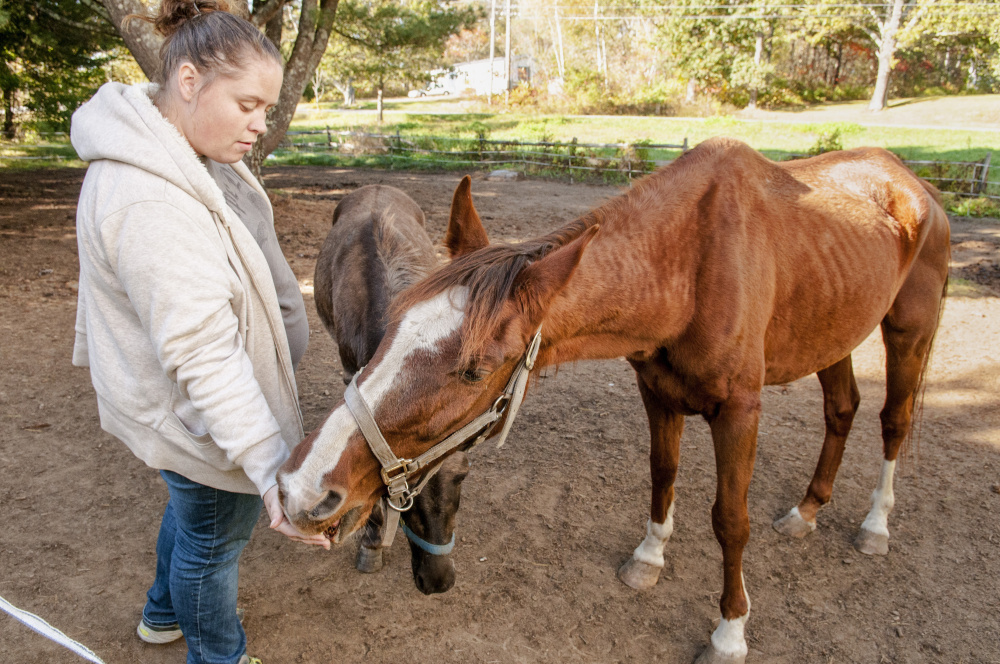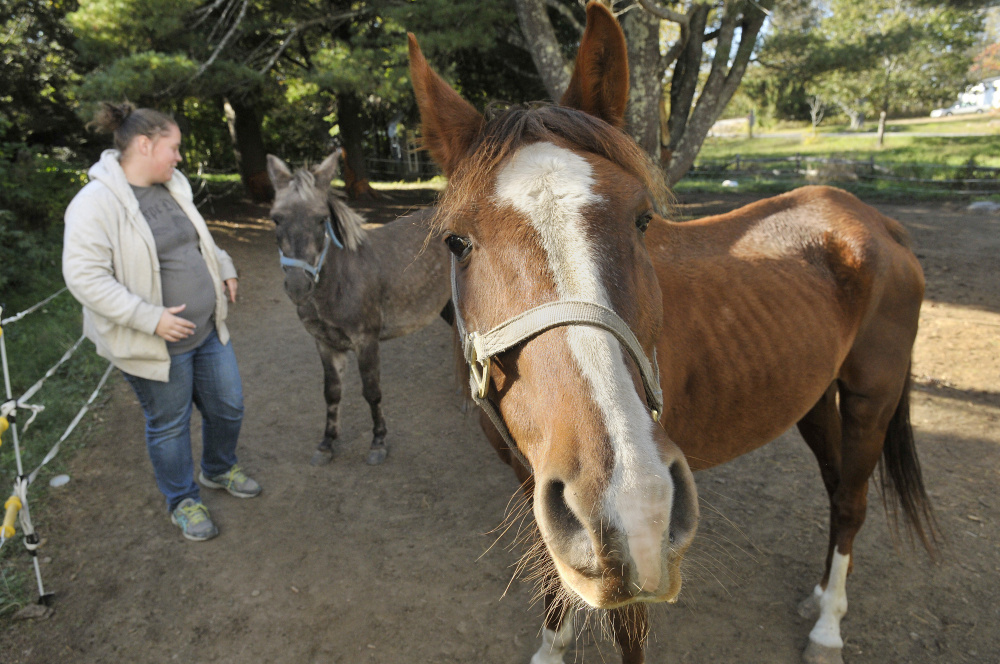PITTSTON — Some Facebook users are calling for a horse to be confiscated and its owners to be punished after photos of the animal with bony flanks began circulating Thursday on the website.
The 23-year-old gelding, Zin, has lost about 100 pounds in the last six months, say its owners, Armand Cookson and Kelsey Radley of Pittston. They say the horse is losing weight because of a medical condition that a veterinarian hasn’t been able to diagnose, and despite greater quantities of horse feed.
While Cookson and Radley appreciate people’s concern for the animal, and the mule that shares its enclosure, they’re asking that people refrain from going to their home and trying to feed Zin, as some have done.
“If someone would like to talk to us in person they can leave a note and we will get back to them,” Cookson said. “We are now being harassed and people are stalking the house to try to get a look at the horses.”
Pittston’s animal control officer and the state’s animal welfare director declined to discuss the allegations about the horse and said they’re being investigated.
In the Facebook post, which has been shared by more than 475 users, a woman identifying herself as Kathie Johnson Tuck described the location of Cookson’s and Radley’s home.
“They are starving,” Tuck wrote of the two animals. “Today Tom and I took some hay up to them. I can’t continue to do it, but I can’t watch them slowly die from hunger. Please help me get these animals away from there. Call the state animal control and make a complaint.”
Many Facebook users have responded.
“Do not bring hay as hard as that is,” a woman wrote in the comment section. “If they have hay the authorities will not do anything!”
“Make your post public and we will share,” added another. “The outrage must spread!!”
Tuck didn’t respond to a direct Facebook message, a comment on her photos, or a voicemail message left Friday.
Deb Sullivan, Pittston’s animal control officer, said she first received a complaint about Radley’s and Cookson’s horse late last spring, and the investigation was taken over by the state’s Animal Welfare Program.
Liam Hughes, the director of that program, said he couldn’t discuss the case because it’s an open investigation. He also cautioned people to not base their impression of any animal welfare situation on what they read on social media.
“A lot of the time you see something on Facebook, and you’re not getting the full story,” he said.
Hughes advised people to contact his office about any animal abuse or neglect they observe in “real life,” as opposed to what they hear secondhand.
When his office gets a complaint, one of its agents will visit the site, decide whether the animal has adequate food, shelter and medical care, and try to educate the owners about their responsibilities, Hughes said. If the owners fail to meet those standards, or if the agents determine the animals’ lives are in danger, the agents can remove the animals and take legal action.
But the welfare office can’t remove animals right away, Hughes said, as a poor investigation could lead to a court returning an animal to its owners.
Cookson and Radley have had their horse for about four years, and say that he started losing weight at the end of last winter. A veterinarian already has administered a test to Zin for Lyme disease, which came back negative, and he soon will be tested for Cushing’s disease, Radley said.
Cushing’s disease is an endocrine abnormality that affects older horses, according to a 2011 report from the University of Florida. Its clinical signs can include longer hair resulting from a failure to shed, muscle atrophy, lethargy and a ravenous appetite.
Until Thursday, Zin and the mule, which belongs to Radley’s sister, lived in an enclosure that’s about 50 feet long and shaded by a pine tree growing in the middle. A plastic feed container lay in one corner. At night, the animals sleep in a barn, Radley said.
Radley and Cookson were planning to move Zin to a different enclosure on their property that’s away from the road and harder for visitors to see, they said.
“We’re trying to keep people’s nose out of this until we can figure out what is happening, because we don’t want all this negative attention drawn to this horse,” Radley said.
To compensate for Zin’s weight loss, Radley has been feeding him eight quarts of high-protein feed per day, which is 33 percent more than he was eating six months ago, she said.
She also will give him an extra two quarts per day of a supplement soon, she said, and worries that any outside grain he eats “is going to interfere with whatever progress we’re trying to make right now with him.”
Charles Eichacker can be contacted at 621-5642 or at:
ceichacker@centralmaine.com
Twitter: @ceichacker
Send questions/comments to the editors.




